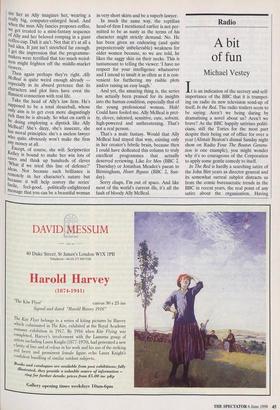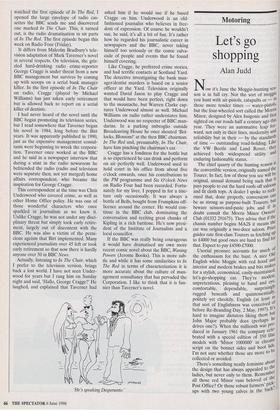Radio
A bit of fun
Michael Vestey
It is an indication of the secrecy and self- importance of the BBC that it is trumpet- ing on radio its new television send-up of itself, In the Red. The radio trailers seem to be saying: Aren't we being daring by dramatising a novel about us? Aren't we brave? As the BBC happily satirises politi- cians, still the Tories for the most part despite their being out of office for over a year (Alistair Beaton's dismal Sunday night show on Radio Four The Beaton Genera- tion is one example), you might wonder why it's so courageous of the Corporation to apply some gentle comedy to itself.
In The Red is hardly a searching satire of the John Birt years as director general and its somewhat surreal subplot distracts us from the comic bureaucratic trends in the BBC in recent years, the real point of any satire about the organisation. Having watched the first episode of In The Red, I opened the large envelope of radio cas- settes the BBC sends me and discovered one marked In The Chair. This, it turned out, is the radio dramatisation in six parts of In The Red. The first episode began this week on Radio Four (Friday).
It differs from Malcolm Bradbury's tele- vision adaptation of Mark Taverner's novel in several respects. On television, the griz- zled hard-drinking radio crime-reporter George Cragge is under threat from a new BBC management but survives by coming up with scoops on a serial bank manager killer. In the first episode of In The Chair on radio, Cragge (played by Michael Williams) has just taken early retirement but is allowed back to report on a serial killer of dentists.
I had never heard of the novel until the BBC began promoting its television series, but I read somewhere that Taverner began his novel in 1984, long before the Birt years. It was apparently published in 1990, just as the expensive management consul- tants were beginning to wreck the corpora- tion. Taverner once worked at the BBC and he said in a newspaper interview that during a stint in the radio newsroom he befriended the radio (radio and television were separate then, not yet merged) home affairs correspondent, who became the inspiration for George Cragge.
This correspondent at the time was Chris Underwood who covered crime, as well as other Home Office policy. He was one of those wonderful characters who once sparkled in journalism as we knew it. Unlike Cragge, he was not under any disci- plinary threat but simply took early retire- ment, largely out of discontent with the BBC. He was also a victim of the perni- cious ageism that Birt implemented. Many experienced journalists over 45 left or took early retirement so that now there is hardly anyone over 50 in BBC News.
Actually, listening to In The Chair, which I prefer to the television version, brings back a lost world. I have not seen Under- wood for years but I rang him on Sunday night and said, 'Hallo, George Cragge?' He laughed, and explained that Taverner had asked him if he would sue if he based Cragge on him. Underwood is an old- fashioned journalist who believes in free- dom of expression. Of course he wouldn't sue, he said, it's all a bit of fun. It's rather how he regarded his journalistic career in newspapers and the BBC, never taking himself too seriously or the comic calva- cade of people and events that he found himself covering.
Like Cragge, he preferred crime stories, and had terrific contacts at Scotland Yard. The detective investigating the bank man- ager/dentist murders is based on a senior officer at the Yard. Television originally wanted David Jason to play Cragge and that would have been perfect, right down to the moustache, but Warren Clarke cap- tures Underwood almost as well. Michael Williams on radio rather understates him. Underwood was no respecter of BBC man- darins. In a parking imbroglio outside Broadcasting House he once shouted 'Bol- locks, Blossom!' at the then BBC chairman. In The Red and, presumably, In The Chair, have him pinching the chairman's car.
Cragge has a fondness for the bottle but is so experienced he can drink and perform on air perfectly well. Underwood used to hold court in his office from about five o'clock onwards, once his contributions to the PM programme and Six O'clock News on Radio Four had been recorded. Fortu- nately for my liver, I popped in for a tinc- ture only occasionally. It was always a bottle of Bells, bought from Frumpkins off- licence around the corner. He would con- tinue in the BBC club, dominating the conversation and reciting great chunks of Kipling in a rich baritone. He's now presi- dent of the Institute of Journalists and a local councillor.
If the BBC was really being courageous it would have dramatised my own more recent comic novel about the BBC, Waning Powers (Jerome Books). This is more sub- tle and while it has some similarities to In The Red in terms of characterisation it is more accurate about the culture of man- agement consultancy that has pervaded the Corporation. I like to think that it is fun- nier than Taverner's novel.
'He's speaking Desperanto.'



























































 Previous page
Previous page